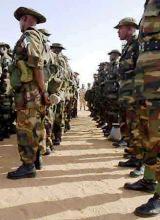South Africa troop deployment in Sudan’s Darfur delayed
JOHANNESBURG, Parliament, Feb 28, 2005 (SAPA) — The deployment of South African troops to strife-torn western Sudan has been postponed due to alleged delaying tactics by the Sudanese government, SA National Defence force officers told MPs on Monday.

|
|
Nigerian soldiers arrive in El-Fasher. |
Briefing the National Assembly’s defence portfolio committee, Col Johan van der Walt said 186 soldiers from the Infantry Protector Company were to have left for Sudan earlier on Monday as part of an African Union peacekeeping mission.
“But the deployment was delayed because the troops did not have passports and visas, as now required by the Sudanese government,” he said.
Rear Admiral Edward Ratala, director of operations from Joint Operations, said the AU had initially been told by the Sudanese government no passports were needed, and visas could be obtained on arrival.
“But now they have confronted us with no-fly zones – not permitting our troops to fly over certain areas – and say they must have visas before departure,” Ratala explained.
South Africa was expected to send about 300 troops over the course of this week to the region, he said.
The AU has a mandate to send 3,320 troops from various African countries to the region to “investigate, report and monitor” on events.
Van der Walt said that after numerous visits to the region, he felt the Sudanese government was “turning a blind eye to the atrocities in Sudan”.
He said the actions of the Janjawid militia, accused of attacking villages in southern Sudan and killing the inhabitants, were benefiting the Sudanese government.
The killings “centralized” the population, as the survivors fled into refugee camps, making them easier to police in the huge country.
He said a camp outside the city of Al-Fashir – AU headquarters, and the provincial capital of Sudan’s north Darfur region – was now home to 60,000 refugees.
Most of the South African contingent would be based in the town of Kutum, about 200 km northwest of Al-Fashir.
Van der Walt said the deployment of troops to Sudan was South Africa’s first mission outside southern and central Africa, and was “fraught with difficulties”.
It would be a “dry deployment”, which was a first for the SANDF; and because of Sudanese attitudes towards women, very few would take part in the operation.
“Can you imagine sitting in a desert for six months without a beer,” Van der Walt asked members, explaining the deployment zone resembled the Karoo, except with fewer shrubs and more sand.
He said the troops would have to be particularly sensitive to “Islamic taboos” on alcohol and condoms.
Committee chairman Kader Asmal suggested this term be changed to “religious views”.
“I think you should change Islamic to religious taboos, because I know many Muslims who have no problems with those vehicles of enjoyment,” he said, to the amusement of the committee.
